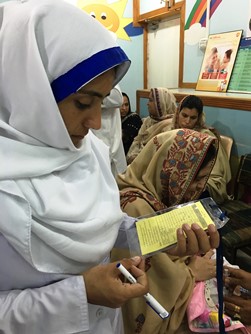The workshop is the outcome of collaborative work between the 3 levels of the Organization – WHO headquarters, Regional Office for the Eastern Mediterranean and country office in Pakistan with the Ministry of Health and Drug Regulatory Authority of Pakistan. It aims also to strengthen the regulatory systems and particularly the regulatory function of pharmacovigilance – activities relating to the detection, assessment, understanding and prevention of adverse effects or any other drug-related problems.
In 2011, WHO launched the Global Vaccine Safety Blueprint which focuses on building national capacity for vaccine safety in low- and middle-income countries through the coordinated efforts of major stakeholders. This was followed by the Global Vaccine Safety Initiative to implement the blueprint in countries. In addition, following the pandemic influenza occurred in 2009, The pandemic influenza preparedness (PIP) framework was developed to implement a global approach to pandemic influenza preparedness and response in order to improve and strengthen the sharing of influenza viruses with human pandemic potential, to increase the access of developing countries to vaccines and other pandemic related supplies that includes among other components the development, production and regulatory oversight of influenza vaccines. Pakistan is one of the 2 selected countries in the Region to be supported through PIP framework to improve their regulatory systems and particularly the vaccine safety system.
During the workshop, meetings were held with federal managers of the Expanded Programme on Immunization (EPI), EPI professionals and Drug Regulatory Authority/pharmacovigilance regulators, where presentations were made on the WHO methodology and framework for developing/improving/updating the national AEFI surveillance guidelines.
Participants representing the 4 provinces of Pakistan reviewed the status, structure and achievements of the national vaccine pharmacovigilance system, including AEFI monitoring. The programme included sessions on how to review vaccine safety data objectively, identify issues and make decisions. Special focus was given to vaccine safety communications, responding to a vaccine safety crisis, risk assessment and decision-making and the role of risk communication and key messaging and media management.
Within the context of the workshop, field visits were paid to the federal cold store and 2 health facilities in Islamabad conducting activities related to vaccines to help participants assess the safety of vaccination activities.
At the end of the workshop participants worked on developing a draft action plan with 3 priority activities to be implemented in 2016–2017.








 25 August 2016, Islamabad – Within the context of efforts to enhance global vaccine safety and build and support a systemic approach to vaccine pharmacovigilance in all low- and middle-income countries, WHO is holding a workshop on adverse events following immunization (AEFI) surveillance and monitoring in Islamabad, Pakistan, from 22 to 26 August 2016.
25 August 2016, Islamabad – Within the context of efforts to enhance global vaccine safety and build and support a systemic approach to vaccine pharmacovigilance in all low- and middle-income countries, WHO is holding a workshop on adverse events following immunization (AEFI) surveillance and monitoring in Islamabad, Pakistan, from 22 to 26 August 2016. 